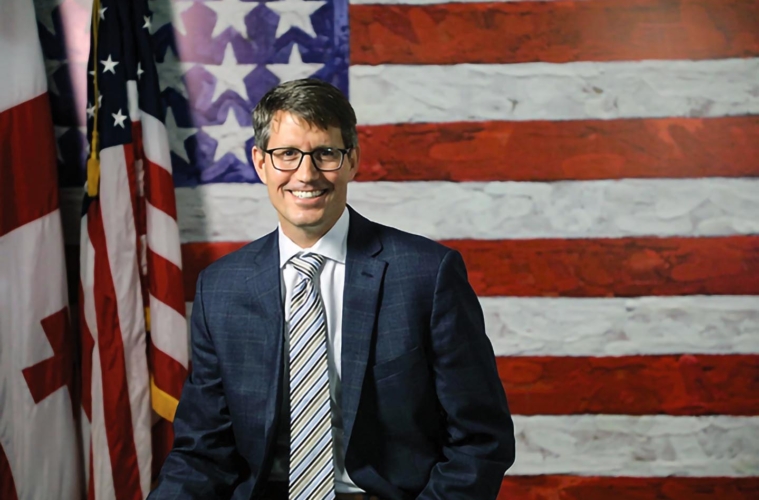Christopher Anderson ’98 recently finished his post as cultural attaché to Georgia. See where he’s going next.
Sometimes a single course can change your life. As a sophomore at Colgate, Christopher Anderson ’98 signed up for a class on the Caucasus and Central Asia and focused on Georgia, the small country squeezed into the crossroads of Russia, Europe, Central Asia, and the Middle East. Under the instruction of then–professors Martha Brill Olcott (political science) and Tony Olcott (Russian), Anderson became fascinated by the deep exploration of the region’s diversity, including its nomadic culture and its burgeoning democracy amid the long shadow of the Soviet Union. “We covered literature, watched movies, heard stories about meeting the people there, and then they put it all into context to look at how it impacted society,” Anderson says. “That’s actually what I do now in my job.”
More than 25 years later, Anderson just finished a stint as cultural attaché to Georgia, where he had a direct ability to influence the country he studied all those years ago. He has now taken up the reins in Washington as director of a State Department’s bureau to promote democracy and human rights throughout the region. Through his work, Anderson has taken tours as a diplomat in countries as diverse as Mongolia, Argentina, and Ukraine — and briefly entered the public eye when he testified during President Donald J. Trump’s impeachment hearing in 2019.
Anderson grew up in between cultures. His mother is Swedish and she met his father, an investment banker, while he was on a Fulbright Scholarship in Stockholm. Anderson himself was born in Iran, lived for the first six years of his life in Denmark, and traveled with his family back to Scandinavia every summer. “I grew up as a third culture kid,” he says. “It helps as a diplomat to have had a foot in both worlds, so you can easily see different perspectives.” He participated in Model UN and mock trial in high school, thinking he’d go into politics, until the Colgate course sent him looking overseas instead. The following year at Colgate, he participated in the Washington, D.C., Study Group and learned how the U.S. government works. After a brief stint in the Department of Justice — where he realized he did not want to become a lawyer — he got a master’s degree in Stockholm and then volunteered with Save the Children in Azerbaijan and worked for the World Bank before joining the State Department in 2005.
Years spent away from family and friends can take their toll, but it’s also been a fascinating journey through food, history, and culture, he says — including braving winters in Ulaanbaatar, where the high could be -29, and confronting the legacy of U.S. involvement in the “dirty war” in Buenos Aires. In Ukraine he played a more active role in international relations as Russia launched its 2014 invasion, and he helped provide reporting to diplomats negotiating to stem the conflict. “Every so often as a diplomat, you are in the wrong place at the right time,” he says. In one case, Anderson learned of an impending attack and helped facilitate the evacuation of a village before Russian troops shelled it. “If we had waited 24 hours, the residents would have been in a much tougher place.”
In his testimony at the Congressional hearing, in which Trump was impeached for withholding military aid to Ukraine for political gain, Anderson gave a passionate defense of the values of foreign service. “We’re not doing this because we want to serve one person’s interest, this is about service. We’re doing this because we are motivated to do something to advance the common good,” he says now. In his most recent posting in Georgia, he came full circle from the Colgate course to meet with journalists and students, helping preserve local music and dance, and refurbish a monastery as a cultural ambassador from the United States. “It’s important to preserve cultural heritage for its own sake,” he says. “At the same time, Russia says the West wants to destroy Georgia’s culture and religion — well, there’s nothing more tangible to counteract that propaganda than to hear we’re restoring a monastery.”
In his new position as director of the State Department’s European and Eurasian Affairs in the Bureau of Democracy, Human Rights, and Labor, Anderson coordinates efforts to promote democratic values in an area stretching from Iceland to Siberia. “We have a lot of problems in our country, but when you go to countries like Georgia, they really look to us as a moral beacon, counteracting forces of authoritarianism,” he says. “It’s great to be in a position where I have the ability to contribute to that.”

